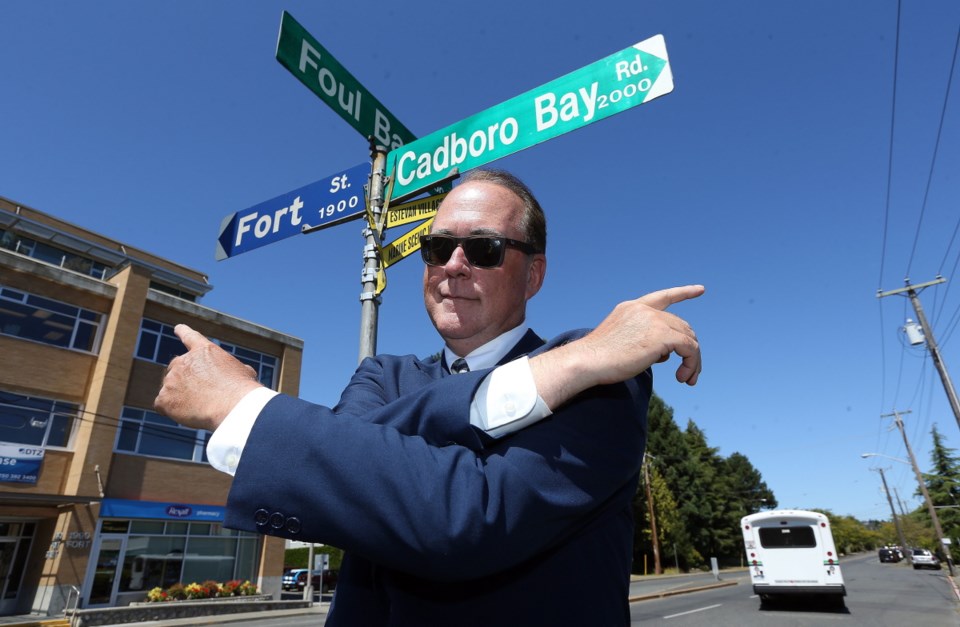 An overwhelming majority of Greater Victorians want to move forward on amalgamation, a new poll shows.
An overwhelming majority of Greater Victorians want to move forward on amalgamation, a new poll shows.
The pro-amalgamation group that commissioned the survey now wants the provincial government to order a study into what a merger of all or some of the region’s 13 municipalities would mean.
Failing that, Amalgamation Yes wants cabinet minister Coralee Oakes to ask voters in November’s civic elections whether they want such a study done.
The group still wants all 13 municipal councils themselves to put a non-binding amalgamation question to voters, but only Victoria has agreed to do so. Other councils maintain the issue is not a priority for their citizens.
Amalgamation Yes vice-chairman John Vickers stressed his group isn’t asking for a referendum on amalgamation, just on whether to do an analysis. “What are you afraid of?” he asks of politicians who balk at asking voters what they think.
The Angus Reid poll found:
- 84 per cent of capital region residents favour amalgamation
- 89 per cent support a non-binding referendum on amalgamation
- 80 per cent want an independent cost-benefit study and analysis
- While 77 per cent are satisfied with the quality of service from their own municipal government, half say municipalities are doing a poor job working together at the regional level
- Only 16 per cent believe the region’s status quo is working
- 84 per cent say costs for larger projects should be shared by all municipalities
- Perceived benefits of amalgamation include reduced governance costs and better regional planning and decision-making. Negatives included a fear that large municipalities would dictate to small ones, a loss of local identity and a loss of local representation.
- While they favour cutting the number of municipalities (only seven per cent say we should keep all 13), respondents were divided on how many there should be: a quarter said there should be one municipality, a quarter said there should be four or five, and 21 per cent said there should be three.
- Respondents said the top three issues facing the CRD are sewage and wastewater, co-ordination between municipalities and transportation.
CLICK HERE to download the full report
Frank Bourree, chairman of the Greater Victoria Chamber of Commerce, said the poll reflected frustration over municipalities’ inability to agree on sewage treatment. “This is the single biggest, most expensive project that taxpayers have faced in this region’s history, and municipal politicians can’t get it right.”
Angus Reid Global surveyed 441 Greater Victoria residents July 16-17, with the breakdown mirroring the relative populations of the region’s 13 municipalities. The sample size carries a 4.7 per cent margin of error.
The poll was paid for by the Chamber of Commerce, the Victoria Hotel Association and the Victoria Real Estate Board.
Although only the samples taken in Victoria and Saanich were considered large enough to be statistically significant, it’s still worth noting that a clear majority of those surveyed in every municipality (save the lone Highlands resident polled) favoured both amalgamation and a referendum.
The question is: what happens next? The province indicated late Tuesday that forcing a referendum would be inappropriate, a response that won’t please Amalgamation Yes reps who left a meeting with Oakes believing she would act if widespread voter interest could be proven. “There are times when the province has to stand up and lead,” Vickers told a morning news conference.
It also seems unlikely that all 13 municipal councils will put an amalgamation study on ballots for the Nov. 15 elections.
Given that B.C. is going from holding civic elections once every three years to once every four, this will be the last chance for voters to have a say until late 2018.



